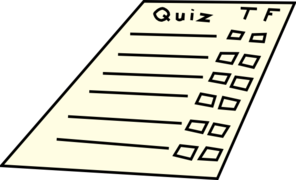Here are the answers with discussion for this Weekend’s Quiz. The information provided should help you work out why you missed a question or three! If you haven’t already done the Quiz from yesterday then have a go at it before you read the answers. I hope this helps you develop an understanding of Modern…
The Weekend Quiz – March 26-27, 2022
Welcome to The Weekend Quiz. The quiz tests whether you have been paying attention or not to the blog posts that I post. See how you go with the following questions. Your results are only known to you and no records are retained.
These were the Quiz questions for the third week of my edX MOOC – Modern Monetary Theory: Economics for the 21st Century.
I promised students that I would provide answers and analysis for them after the course finished.
Quiz #631
- 1. Which of these situations represents an inflationary episode in the macroeconomic sense?
- (a) On July 1, 2000, the Australian government introduced a Goods and Services Tax of 10 per cent on most goods and services (with some exemptions). In the September-quarter 2000, the Consumer Price Index rose by 6.1 per cent.
- (b) The press reported that Australias property prices rose at their fastest rate since 2003 in February 2021.
- (c) The Consumer Price Index rose by 9 per cent in month one, six per cent in month two and 3 per cent in month three.
- (d) The Consumer Price Index rose by 3 per cent in month one, 6 per cent in month two and 9 per cent in month three.
- (a)
- (b)
- (c)
- (d)
- (a) and (b)
- (b) and (c)
- (c) and (d)
- 2. In 2008, the consumer price level in Zimbabwe rose by 157 per cent. Between 1998 and 2008, real GDP fell by 50.7 per cent. The hyperinflation arose mainly because:
- (a) The Zimbabwean government was spending too much.
- (b) The Reserve Bank of Zimbabwe was issuing too much money.
- (c) Private banks were issuing too much credit.
- (d) The supply side of the economy contracted so much that previously normal (non-inflationary) levels of spending growth were now vastly excessive
- 3. An employment buffer stock scheme involves the government offering an infinite demand for labour. This means that:
- (a) the supply of labour is fixed.
- (b) the scheme will expand and contract on demand from workers for jobs.
- (c) the government allocates a fixed amount of currency to run the program.
- (d) unproductive jobs can be created at will.
- 4. A major criticism of mainstream economists of the use of fiscal deficits is that they crowd out productive private spending. That criticism errs because:
- (d) Interest rates are now at very low levels.
- (b) Banks create deposits when they make loans to credit-worthy customers.
- (c) The central bank is part of government.
- (a) A currency-issuing government can buy whatever is for sale in its own currency.
- 5. Commercial banks are required to hold reserve accounts with the central bank for which reason:
- (a) To protect their shareholders from losses.
- (b) To ensure their depositors can earn interest.
- (c) To ensure that all daily transactions in the economy that involve claims between banks can be resolved without any cheques bouncing.
- (d) To make it easier for government to know what is going on in financial markets.
Sorry, quiz 631 is now closed.
You can find the answers and discussion here
